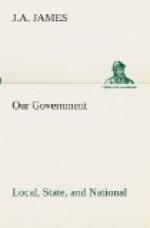(c) The annexation of territory, Hart, Contemporaries, III, 373-376; Walker, The Making of the Nation, 177-184; Hart, The Formation of the Union, 188.
(d) Legal-tender cases, Wilson, Division and Reunion, 280-281.
21. For further questions on this chapter, consult Government in State and Nation, 206, 207.
CHAPTER XII.
POWERS DENIED THE UNITED STATES AND THE SEVERAL STATES.
While restrictions on Congressional powers are found elsewhere in the Constitution, Section 9 of Article I seems to have been framed especially for this purpose.[36]
[Footnote 36: Clause 1 of this article formed an important part of the third great compromise, which was discussed on p. 43.]
Writ of Habeas Corpus.—Clause 2 provides: The privilege of the writ of habeas corpus shall not be suspended, unless when in cases of rebellion or invasion, the public safety may require it.
A writ of habeas corpus is a writ granted by a court, commanding an officer to produce before it a prisoner, in order that the court may inquire into the cause of his imprisonment or detention. If, after such inquiry, it is found that the person is detained for insufficient cause, he is granted his freedom.
President Lincoln and the Writ of Habeas Corpus.—President Lincoln, as a military necessity, in 1861, suspended the privilege of the writ over a limited area, constituting a large part of the State of Maryland. The Supreme Court, however, declared his order non-effective, maintaining that the right of suspending the writ of habeas corpus lay with Congress, though it might be granted to the President. This attempt on the part of the Supreme Court to restrain Mr. Lincoln was a failure, and shows that even the highest of our tribunals may not have its usual power in time of war. It was not until March 3, 1863, that Congress made the decree of President Lincoln legal by authorizing him to suspend the writ whenever he believed the public safety demanded it. In September of that year he declared the suspension general throughout the country.
Ex Post Facto Laws.—Clause 3. No bill of attainder or ex post facto laws shall be passed.
An ex post facto law, as defined by the Supreme Court, is a “law which renders an act punishable in a manner in which it was not punishable when it was committed.” It applies to acts of a criminal nature only.[37]
[Footnote 37: Clause 4 is discussed under National Finances, p. 84.]
Care of Public Money.—Clause 7. No money shall be drawn from the Treasury, but in consequence of appropriations made by law; and a regular statement and account of the receipts and expenditures of all public money shall be published from time to time.
It is proper in a government such as ours that the control of the public money should be lodged with the representatives of the people. Through the annual report of the Secretary of the Treasury, the people may know from what sources our revenues are derived and for what purposes the money is expended.




